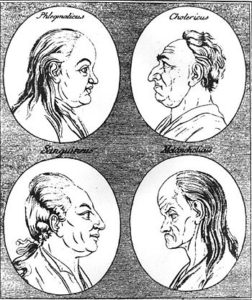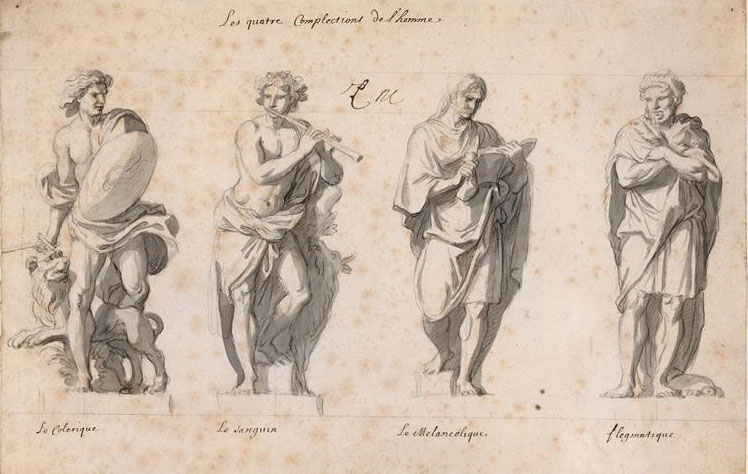One of the first techniques in the toolbox of the traditional astrologer used when interpreting a nativity was the calculation of the temperament of the native. Based upon the humoral theory of the ancient Greek physician Hippocrates, whose school of medicine had an enormous influence on medieval medical theory and practice, the temperament offered a basic psychological description of the person being described in a nativity, their innate disposition through which they experienced the world and interpreted events.
Hippocrates posited the existence of four humours, or fluids, that resided within the human body and which were responsible for its health and, in the case of a severe imbalance, the cause of illness and death. Although the humours were considered to have a physiological basis, they were also regarded as being responsible for the emotional differences between human beings and influenced every aspect of mental functioning, from habits, intelligence, to morality and dreams.
How many temperaments are there?

There are four basic temperaments based on the four qualities of Heat, Coldness, Dryness and Moisture which in turn are qualities of the four basic elements that were thought to comprise matter – Fire, Air, Water and Earth. Although every person will have some of each element present in their makeup, the dominance of one particular element will determine that person’s temperament.
The Choleric, an abunbance of Heat and Dryness, the fiery Type personality. William Lilly tells us “Cholerick people are full of anger, quarrelsome, revengefull, ambitious, importunate, imperious, hardy, rash, involving themselves unto necessary troubles, seditous, many times ingenious, and easily changing their opinions.” Due to the predominance of the fire element, people with a choleric temperament tend to be strong willed, focused, extroverted, goal-oriented, passionate and easily aroused to love and hate. They are the archetypal leader and visionary, and like many visionaries they have little patience for the details. As such, they can become irritable when things are not going their way and are prone to burnout.
The Melancholic, overabundance of Cold and Dry, the Earth Type personality. William Lilly again: “Melanchollick persons are slow in resolutions, fraudulent, keeping close their counsels, prudent, severe, covetous, suspicious, sorrowfull, fearfull, forward, seldome forgeting injuries, inexorable, ambitious, loving no mans esteem but their owne.” As the word suggests, melancholics are often prone to melancholic episodes. They tend to be solitary, introspective, generally intelligent (although their need to mull things over may give the impression of dullness), and these characteristics tend to set them apart from their peers often resulting in loneliness and feeling that they are not understood. Although they may sometimes appear to be emotionally cold and callous, they can have very deep feelings and, as Marsilio Ficino notes in his De Vita, the melancholy temperament is often associated with artists, philosophers and genius of diverse kinds.
The Sanguine, predominantly Hot and Moist, the Air type personality. “A Sanguine temperament shewes men or person cheerfull, liberal, faithfull, affable, peace-makers, open hearted, modest, religious.” If the melancholic is the wallflower hiding in the corner, the sanguine is the social butterfly. Optimistic, good-natured, extroverted but, unlike the choleric, interested in other people, the sanguine is usually the life of the party, and appears to his friends to be either exceptionally lucky in his life or somehow able to generate his own luck. The sanguine possesses a cheerful disposition that is unaffected by even the most cruelest vicissitudes of fate.
The Phlegmatic, Cold and Moist, the Water type personality. Not having much good to say about them, Lilly tells us that phlegmatics “are very cowards, uxorious people mutable, not capable of keeping secrets, dull fellowes and sluggards in performing any businesse.” Water being a passive element and by its nature amorphous (water takes the shape of the container in which it is placed), phlegmatics were viewed with some suspicion. Phlegmatics tend to be imaginative, fantasy prone, empathic and can seem slightly otherworldy to others. They tend to have a highly developed intuitive ability which they rely on to make their decisions. Their carefree “go with the flow” attitudes can be infuriating to some and completely mysterious to others.
Note that, although there are four basic temperaments, it is possible to have two in balance. The temperament is also modified by the Lord of the Geniture, the strongest planet in the nativity, and the Manners of the native, the intellectual capacity and tendencies. Each temperament is also associated with a particular planet (the choleric with Mars, the melancholic with Saturn, the sanguine with Jupiter, and the phlegmatic with the moon), and the strength and placement of this planet in his geniture will have a determining factor in how the temperament is expressed.
How is it calculated and why?
The calculation of the temperament is based upon the ascendant and the planets in the first house or aspecting it, the sun, the moon and the planets beholding her, and the lord of the geniture.
So, now you have your temperament, what do you do with it? While medieval medicine may seem rather odd to us today, it had much in common with other ancient healing modalities such as Ayurveda and Traditional Chinese Medicine, Like these increasingly popular forms of alternative medicine, the Hippocratic-Galenic medicine of medieval times was holistic and centred around the ideal of balance and utilised everything from diet, exercise, herbs, surgery as well as astrological magic to effect a cure.
While I would not advocate a visit to your local barber for a bit of bloodletting today, knowledge of one’s temperament does offer one some important insight that can be used to increase wellness. For example, if you are aware that you are highly choleric, you can determine that you may be prone to overexertion and burnout. In the event that you are going to be in a high stress situation, this knowledge should allow you to plan ahead to take some time out to engage in some activities to lessen the influence of too much choler such as meditation, or a swim in a cool lake.
If you want to know what your temperament is, click on the button below and purchase this report for a fee of £30. Please include your time, date and place of birth, and I will get back to you with the calculation of your temperament.


